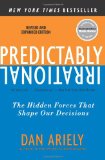“Predictably Irrational” is an entertaining and insightful book by Dan Ariely that seeks to show how irrational we humans are, in sharp contrast to standard economic theory that assumes that people are perfectly rational beings acting in self-interest (Homo Economicus). This realisation forms the basis for the relatively-new field of Behavioural Economics that marries psychology with economics in an attempt to create better models for human economic behaviour. Even if you're not interested in the study of economics, this is a great book to help you understand how your behaviour impacts your ability to take rational decisions and use this awareness to minimise the effect of irrational decisions on your life.
The book uses the results from several studies to point out that not only are we quite irrational while taking economic decisions, contrary to conventional economic theory, but we are also irrational in a very predictable way. This predictability can help us make better economic choices in our lives. (I must point out that most of these studies seem to have been conducted on students at MIT and MBA students from some other universities. I wonder how representative they are of the human population in general. The author himself suggests at one point that MIT has a lot of social misfits.)
This book offers many, many insights into human behaviour - how we are wired to make comparisons even when the items under consideration are not readily comparable and how clever marketers use this to nudge us into buying something, how we are swayed by “FREE!” offers into buy something that we didn't want or into pay more for it, how we tend to value things that we own more than what others judge them to be worth, how we consider a more expensive item to be better than a cheaper alternative, etc. Each of the chapters focusses on an insight like this. The author encourages us to pause after reading each chapter and reflect upon how some of our past behaviour can be explained by the respective insight and how we can change our future behaviour to benefit from the insight.
The book is quite well-written and easily accessible to the lay person. Bibliographic references direct curious readers to books or papers where they can find more information. The amazing thing is that the author manages to explain the structure of his experiments, control groups for each experiment and elimination of confounding factors in such a way that it does not feel burdensome or distracting at all. The text is also peppered with several witty remarks by the author that make it even more interesting to read. The author must be commended for pulling off such a feat with deceptive ease.
For the more serious reader, the book does not quite explain just how economics should be updated to account for the predictably irrational behaviour of real humans compared to those of idealised humans with rational behaviour. Some of this is implicitly contained in each chapter, but I was expecting something like a grand overview of which classic economic theories need to be modified and how, based on the research of the authors and his associates. I have a feeling that this could have been achieved without making the book too taxing for the lay reader, though I do suspect that it would have bloated the book without providing much benefit to the vast majority of its target audience. Perhaps the intent of the author was to merely ask economists to abandon Homo Economicus in favour of Homo Sapiens and adjust their theories accordingly without undertaking such a venture himself.
